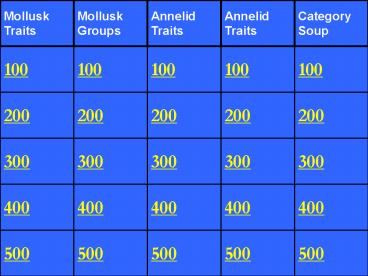Mollusk - PowerPoint PPT Presentation
1 / 51
Title: Mollusk
1
Mollusk Traits
Mollusk Groups
Annelid Traits
Annelid Traits
Category Soup
100
100
100
100
100
200
200
200
200
200
300
300
300
300
300
400
400
400
400
400
500
500
500
500
500
2
A membrane that surrounds the internal organs
3
Mantle
4
While most are separate sexes, a few are this
5
Hermaphrodites
6
This type of symmetry is found in all mollusks
7
Bilateral symmetry
8
The toothed tongue found in some mollusks
9
Radula
10
The breathing apparatus of aquatic and marine
mollusks
11
Gills
12
This group includes the snails and slugs
13
Gastropods
14
This group includes the clams, oysters and
scallops
15
Bilvalves
16
This group includes the squid, octopus and
nautilus
17
Cephalopods
18
The only cephalopod with an external shell
19
Nautilus
20
The bivalve with many eyes and that swims
21
Scallops
22
The tube within a tube body plan refers to this
system
23
Digestive tract
24
This characteristic allows for more specialized
functions
25
Segmentation
26
Sensory organs are found on this end of the body
27
Anterior (front)
28
Segmented worms have this type of circulatory
system
29
Closed
30
Land annelids are usually hermaphroditesMarine
annelids are usually this
31
Separate sexes
32
The part of the digestive tract where food is
ground up
33
Gizzard
34
The number of aortic arches (hearts) in an
earthworm
35
ten
36
The class to which earthworms belong
37
Oligochaeta
38
The class to which leaches belong
39
Hurudinea
40
The members of the class polychaete
41
Bristle worms
42
Where bristleworms are found
43
Ocean (marine environements)
44
The structure in mollusks that grows the shell
45
Mantle
46
Organs that remove metablolic wastes from an
animals body
47
Nephridia
48
A system where blood move through vessels into
open spaces within the body
49
Open circulatory system
50
The animal that has setae
51
Earthworm































